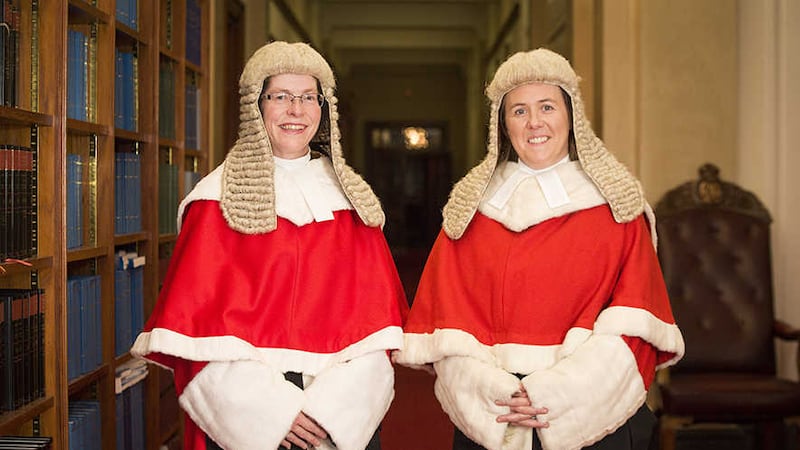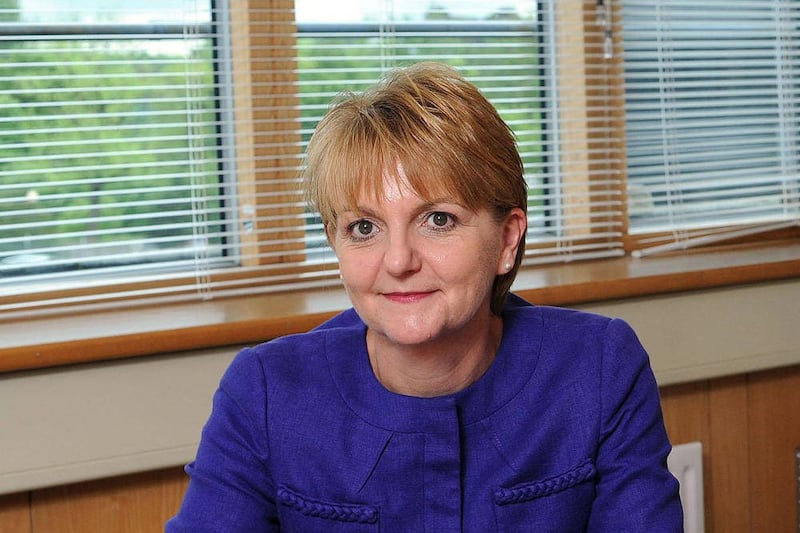HISTORY has been made as Denise McBride QC and Siobhan Keegan QC today became the first female High Court judges to be appointed in the north.
With their appointments having been approved by the Queen, the new judges were sworn in by Lord Chief Justice Sir Declan Morgan.
It marks the first time there will be a female judge in the jurisdiction's higher courts, bringing the north into line with the rest of Ireland and the UK.
Both women were deemed `appointable' by the Northern Ireland Judicial Appointments Commission (NIJAC) some time ago, but the process stalled following an intervention by another potential candidate.
The two new appointees fill places on the High Court Bench vacated by Justice Reginald Weir and Justice Ronald Weatherup who were both elevated to Appeal Court judges over the summer.
NIJAC chairman Sir Declan Morgan welcomed the appointments.
"Ms Denise McBride QC and Mrs Siobhan Keegan QC are excellent lawyers and meritorious appointments and I am confident they will serve as members of the judiciary for the benefit of the community as a whole," he said.
"Since assuming the role of Lord Chief Justice and chairman of NIJAC, I have promoted a number of initiatives aimed at ensuring that the judiciary is as reflective as possible of the community, while at the same time emphasising that the merit principle should never be compromised.
"I will continue to encourage our most talented practitioners to put themselves forward for appointment, safe in the knowledge that merit will always be the overriding consideration.
"These appointments are a clear demonstration that diversity and merit go hand in hand."
Ms McBride has appeared as an advocate at all court levels, including the UK's Supreme Court. She has specialised in chancery, family, civil and international law.
She served as vice chair of the Bar Council between 2012-2014, before being replaced in that role by fellow new High Court judge Mrs Keegan.
Mrs Keegan was appointed QC in 2006 and while specialising in family law has also worked in a range of other areas, including criminal, judicial review, and other civil law.
The Irish News highlighted the shocking lack of female representation at the highest echelons of the judiciary in August, with former police ombudsman Nuala O'Loan warning the talent of capable women lawyers is being wasted.
Even on the lower benches, only a handful of prominent female judges hear cases.
Eleven High Court judges have been appointed since 2001 and five appeal court judges since 2007 – but all have been men.
The latest was Adrian Colton QC last month.
In August, Mr Justice Ronald Weatherup and Mr Justice Reginald Weir were appointed to the Northern Ireland appeal court, which - with an existing vacancy - left three seats on the bench to be filled.
Judge Corinne Philpott has served in the county court since 1998 and Judge Melody McReynolds has been hearing cases there since 2004.
Only two other women have been appointed to that bench since then, Judge Patricia Smyth in 2010 and Judge Donna McColgan in 2013 – they join a phalanx of 13 men, a dozen of whom have been appointed since the millennium.
Northern Ireland Lord Chief Justice Declan Morgan identified the lack of representation of women in the judiciary as a problem in 2012, when he said hopes that historical imbalances would diminish naturally through recruitment on merit do not seem to be bearing fruit.
He said he would be to looking "at things that help or hinder progression at all career stages" and, along with the wider profession, needed to “"get the evidence base as a result of the research, take the problem apart, see what steps may be needed to lever change, develop a plan and put it into action".
The Equality Commission has said it is clear that women are "underrepresented in the highest offices of the judiciary" and it is important that work is done "to identify and remove the barriers faced by women progressing through all areas of the justice system".





